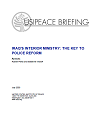Iraq's Interior Ministry: The Key to Police Reform
In 2007, the Los Angeles Times reported that Iraq's interior ministry (MOI) had become a "federation of oligarchs" where various floors were controlled by rival militias and power struggles were resolved by assassinations in the parking lot. Today, the MOI is responsible for nearly 500,000 members of Iraq's security forces, but still struggles despite major US and UK efforts. A panel of experts discussed the current situation in Iraq at a meeting of USIP's Security Sector Reform Working Group.
In 2007, the Los Angeles Times reported that Iraq's interior ministry (MOI) had become a "federation of oligarchs" where various floors were controlled by rival militias and power struggles were resolved by assassinations in the parking lot. Today, the MOI is responsible for nearly 500,000 members of Iraq's security forces, but still struggles despite major US and UK efforts. A panel of experts discussed the reform program's past and prospects.
Speakers
- Alex Martin
Director, U.K.'s Iraq Interior Ministry Reform Project - Col James Coffman (Ret.)
Former Military Advisor to the Minister of Interior, Iraq (2007–2009) - Matt Sherman
Former Advisor to the Minister of Interior, Iraq (2003–2006) - Michael Gordon
Chief Military Correspondent, The New York Times
Jennings Randolph Senior Fellow, U.S. Institute of Peace - Robert Perito, Moderator
Director, Security Sector Reform Working Group, U.S. Institute of Peace
Explore Further
- Read USIP's Peace Brief on Iraq's Interior Ministry
- Read USIP's Special Report on The Interior Ministry's Role in Security Sector Reform
- Learn more about USIP's work on Security Sector Governance and Security Sector Reform



